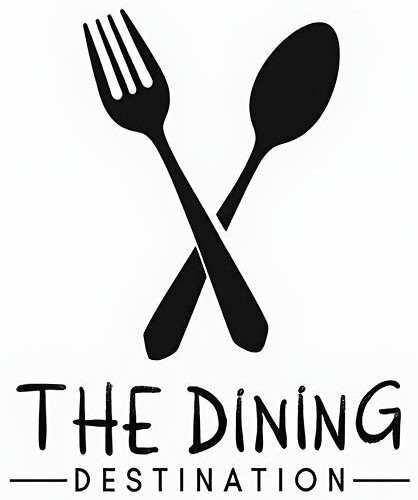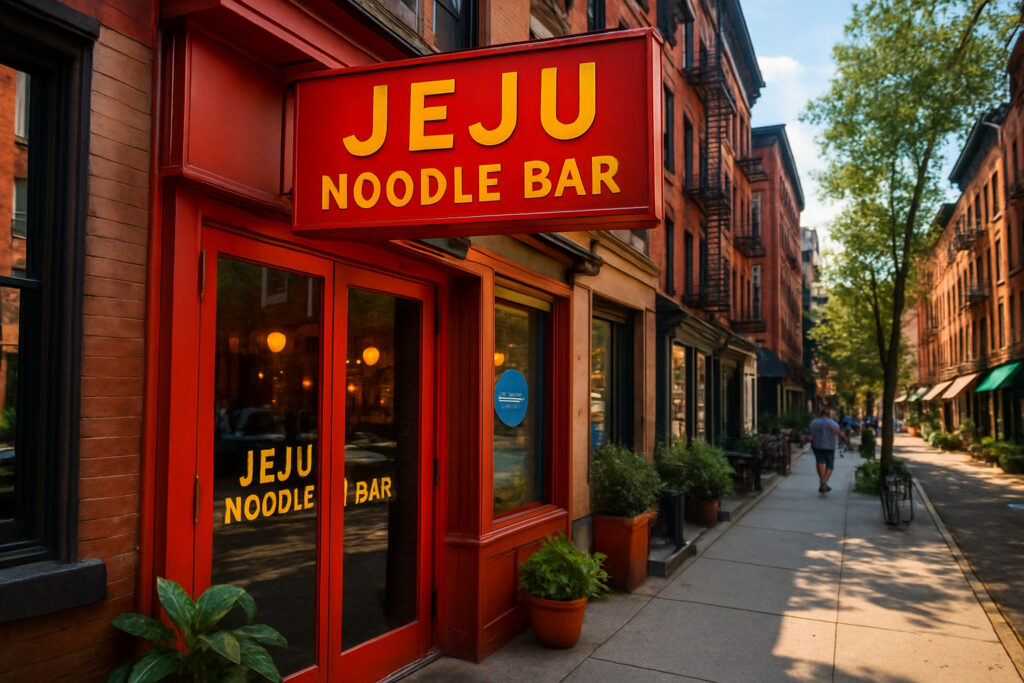Why Jeju Noodle Bar is NYC’s Most Accessible Michelin Star Experience
Jeju noodle bar rightfully is the first noodle restaurant in the United States to earn a Michelin star, making it a game-changer for both Korean cuisine and affordable fine dining in New York City.
Quick Facts:
- Location: 679 Greenwich Street, West Village, NYC
- Hours: Wed-Fri 5-10 PM, Sat-Sun 3-10 PM (Closed Mon-Tue)
- Michelin Status: One star since 2019
- Price Range: $22-$38 for signature ramyun dishes
- Reservations: Required via Resy or call (646) 666-0947
- Specialty: Korean-style ramyun with rich pork bone broth
Using The Dining Destination learn all there is to know about this amazing spot! Located in Manhattan’s trendy West Village, this intimate restaurant has held its Michelin star recognition since at least 2019. What makes it truly special is its affordability – you can experience Michelin-starred dining for under $40 per person, making it one of NYC’s least expensive starred restaurants.
The restaurant draws inspiration from Korea’s Jeju Island, known for its exceptional pork and coastal flavors. Chef Douglas Kim has created a menu that celebrates traditional Korean ramyun while elevating it to fine-dining standards.
The aroma of the pork bone broth precedes the arrival of the gochu ramyun – a sensory experience that Michelin inspectors specifically highlight. This attention to detail, combined with an open kitchen where diners can watch each dish come together, creates an engaging atmosphere that goes far beyond typical noodle shops.
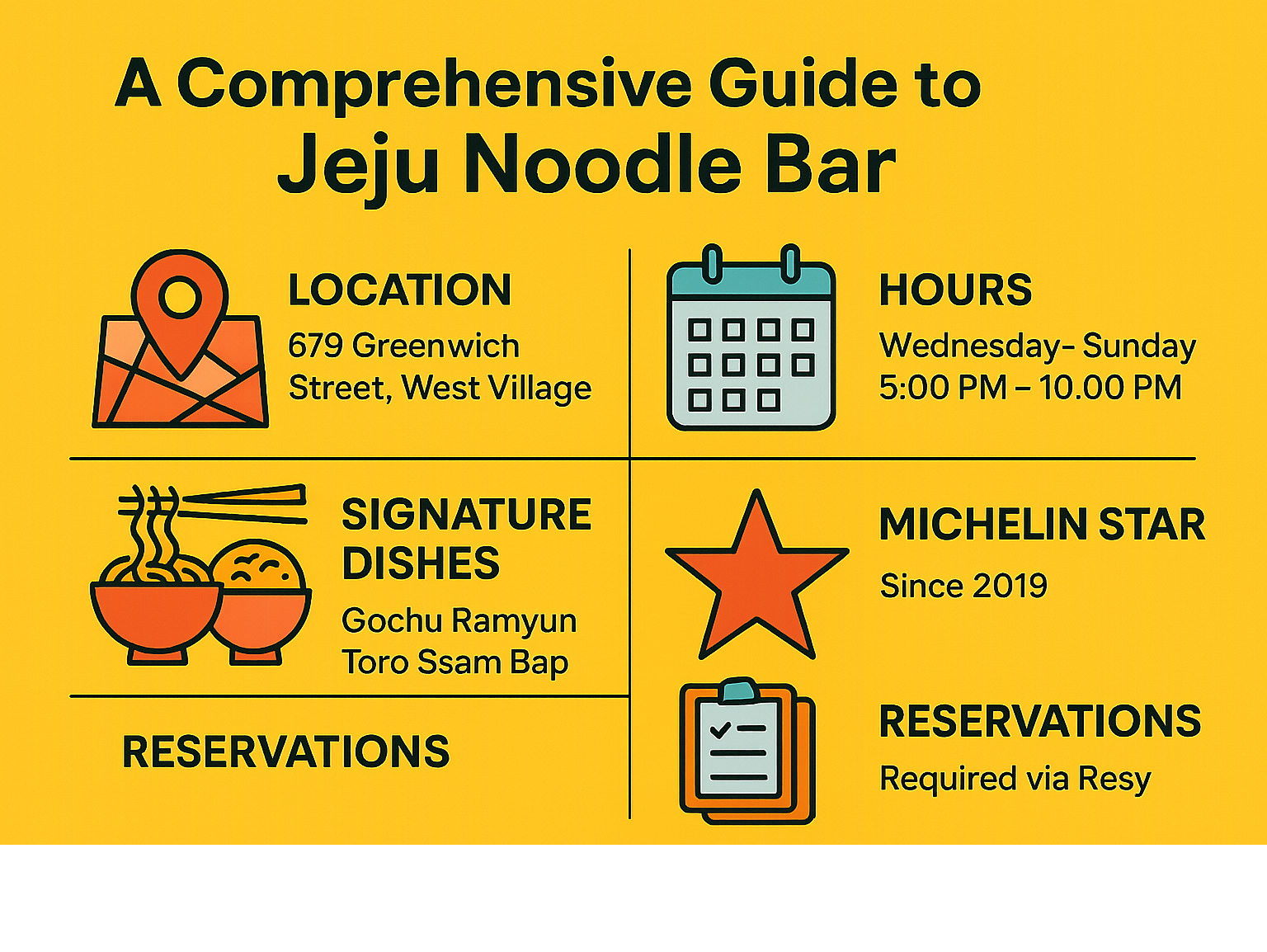
Jeju Noodle Bar: Origins, Concept & Accolades
Jeju noodle bar has quietly revolutionized New York City’s dining scene from its cozy corner at 679 Greenwich Street in the West Village. What started as Chef Douglas Kim’s dream to bring authentic Korean ramyun to Manhattan has become something much bigger – the first noodle-focused restaurant in America to earn a Michelin star.
The achievement is remarkable not just for its rarity, but for how Jeju noodle bar has maintained this prestigious recognition since 2019 while keeping prices refreshingly reasonable. While most Michelin-starred restaurants will set you back $100 or more per person, you can experience world-class dining here for under $40.
The Jeju Noodle Bar – Michelin Guide listing captures what makes this place special: “high quality cooking” served at an engaging counter where diners can watch their bowls come to life. It’s fine dining without the stuffiness – exactly what modern food lovers crave.
Chef Kim’s vision was beautifully simple: honor Korean noodle traditions while making them accessible to New Yorkers who might never have experienced authentic ramyun. The result is a restaurant that feels both familiar and completely new.
The Story Behind “Jeju Noodle Bar”
The name isn’t just catchy – it tells a story. Jeju Island, South Korea’s largest island, sits off the southern coast like a culinary treasure chest. The island is famous for its black pork, raised by pigs that roam freely across volcanic terrain, developing incredibly rich and complex flavors.
This island heritage runs through every bowl served at the restaurant. The pork-rich cuisine and coastal flavors of Jeju translate beautifully into the restaurant’s signature broths. When you taste that first spoonful of their pork bone broth, you’re experiencing generations of Korean culinary tradition.
Chef Kim draws from childhood memories and traditional cooking techniques, but he’s not stuck in the past. The restaurant’s Jeju Noodle Bar | Linkedin presence shows their commitment to connecting with the community and sharing their culinary philosophy.
The name inspiration evokes those rustic noodle shops scattered across Jeju’s countryside – simple places where locals gather for comfort food. But here in Manhattan, that same spirit gets lifted to meet sophisticated palates without losing its soul.
“Jeju Noodle Bar” in NYC’s Korean Dining Boom
Jeju noodle bar opened right as Korean cuisine was exploding in New York City, but it took a different path than most Korean restaurants. While K-BBQ spots dominated the scene with their tabletop grilling and group dining, this restaurant pioneered something new: chef-led experiences focused entirely on noodles.
The noodle focus was brilliant timing. Japanese ramen had already won over New Yorkers, but Korean ramyun offered something distinctly different – bolder flavors, spicier profiles, and unique ingredients that stood apart from the familiar tonkotsu and miso broths.
This approach represents the Korean fine-casual trend perfectly. It’s sophisticated enough to earn a Michelin star, yet casual enough that you can slurp your noodles at the counter in jeans. No tableside grilling, no complicated banchan spreads – just exceptional bowls of ramyun that happen to be world-class.
The restaurant proves that innovation doesn’t always mean reinventing the wheel. Sometimes it’s about perfecting something traditional and presenting it in a fresh context. This philosophy aligns perfectly with current More info about Innovative Restaurant Concepts that prioritize authenticity and accessibility.
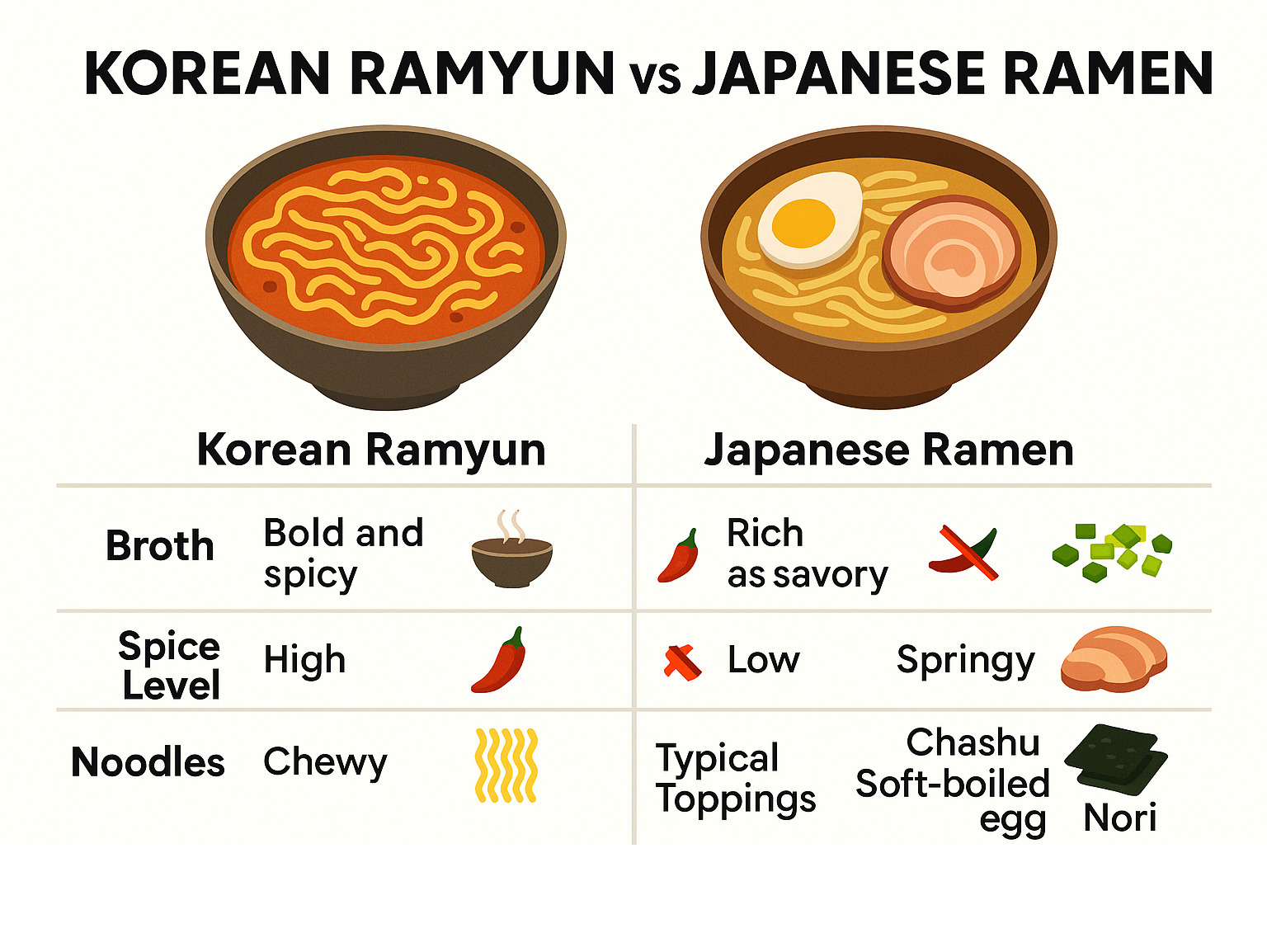
Signature Dishes & Beverage Program
The heart of Jeju noodle bar lies in its carefully crafted menu that celebrates Korean ramyun traditions while pushing creative boundaries. Every bowl tells a story, starting with the legendary gochu ramyun that earned this place its Michelin recognition.
The gochu ramyun is more than just a noodle soup – it’s an aromatic experience that begins before the bowl reaches your table. The rich pork bone broth, simmered for hours until it reaches an almost creamy consistency, fills the intimate dining room with an irresistible aroma that Michelin inspectors specifically praised.
But the menu extends far beyond this signature dish. The toro ssam bap showcases Chef Douglas Kim’s willingness to blend Korean traditions with unexpected influences. This creative dish pairs buttery toro (tuna belly) with scrambled egg and tobiko, all wrapped in crisp lettuce with toasted seaweed. It’s the kind of dish that shouldn’t work on paper but absolutely sings on the palate.
For those seeking the ultimate indulgence, the wagyu ramyun lifts the noodle experience with premium beef that melts into the rich broth. The mada ramyun offers a different flavor journey while maintaining the restaurant’s signature depth and umami complexity that keeps diners coming back.
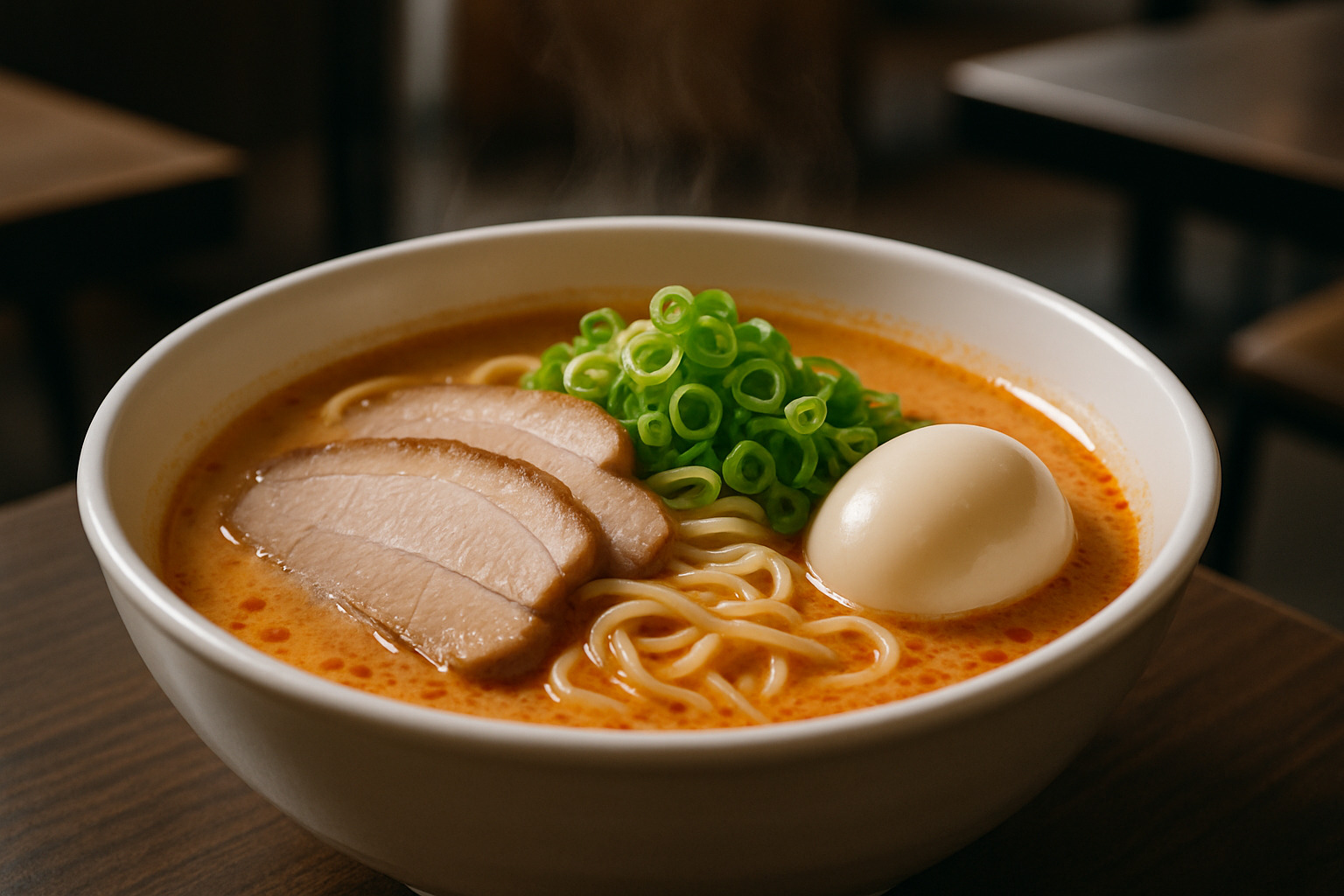
The supporting cast of dishes deserves equal attention. The Persian cucumber kimchi with spicy plum dressing serves as a bright, acidic counterpoint to the rich ramyun bowls. Think of it as your palate’s reset button between slurps of that incredible broth.
Seasonal specials keep the menu dynamic and give regulars new reasons to book another table. These limited-time offerings often showcase ingredients at their peak, reflecting the kitchen’s commitment to quality and creativity.
The beverage program deserves its own spotlight. The craft soju cocktails aren’t just afterthoughts – they’re carefully designed to complement the bold, spicy flavors without getting overwhelmed. The sake pairings show similar thoughtfulness, with selections that improve rather than compete with the complex broths.
Menu Highlights & Flavor Profiles
Understanding what makes Jeju noodle bar special starts with appreciating the foundation of every bowl: that remarkable pork bone broth. This isn’t your typical clear Korean soup. Instead, it’s a deeply rich, almost creamy base that’s been coaxed into perfection through hours of careful simmering.
The magic happens in the spicy-savory balance that defines Korean cuisine at its best. The heat from gochugaru (Korean red pepper flakes) and gochujang (fermented chili paste) doesn’t just burn – it builds layers of flavor. You’ll taste smokiness, subtle sweetness, and that deep umami richness that makes you want to drink every last drop.
House-made noodles make all the difference here. Unlike the delicate strands you might find in Japanese ramen, these Korean-style noodles have serious chew. They’re substantial enough to hold their own against the bold broth, creating that satisfying texture contrast that keeps your chopsticks moving.
The seafood accents throughout the menu reflect Jeju Island’s coastal heritage beautifully. Whether it’s the premium toro or the sushi-grade amberjack in the pyunche salad, these oceanic elements add brightness that cuts through the richness without losing complexity.
What ties everything together is the incredible umami depth in every dish. This savory fifth taste comes from fermented ingredients, aged pastes, and those long-simmered broths. It’s what transforms a simple noodle soup into something that haunts your dreams and brings you back for more.
Value for a Michelin Star
Here’s where Jeju noodle bar truly shines: delivering genuine Michelin-starred quality without the heart-stopping price tag. With entrées ranging from $22-$38, this represents some of the best value in NYC’s fine dining scene.
Let’s put this in perspective. Most Michelin-starred restaurants in Manhattan will easily cost you $100+ per person, often requiring expensive tasting menus that lock you into a lengthy evening. At Jeju noodle bar, you can enjoy a complete, deeply satisfying meal – including appetizers and drinks – for under $50.
The restaurant smartly offers both à la carte ordering and occasional tasting sets, giving you the flexibility to craft your own experience. Want to focus on that legendary gochu ramyun and call it a night? Perfect. Feel like exploring multiple dishes? The pricing makes it totally doable.
This budget-friendly luxury approach captures something special about modern dining. You get the creativity, technique, and quality ingredients worthy of Michelin recognition, but in a relaxed setting where you won’t stress about the bill. It’s the kind of place that proves exceptional dining doesn’t have to be precious or pretentious.
The value becomes even more apparent when you consider the cost-per-experience. You’re not just paying for food – you’re getting front-row seats to watch skilled cooks craft each bowl in the open kitchen, plus the satisfaction of experiencing something truly unique in NYC’s dining landscape. For more insights into exceptional dining experiences, check out More info about Best Unique Restaurants.
Practical Info: Hours, Reservations & Dietary Notes
Jeju noodle bar operates on a limited schedule that reflects its commitment to quality over quantity. The restaurant is open Wednesday through Friday from 5:00 PM to 10:00 PM, and Saturday through Sunday from 3:00 PM to 10:00 PM. They’re closed Monday and Tuesday, which allows the kitchen team to prep and maintain their high standards.
This schedule is typical for chef-driven restaurants that prioritize ingredient sourcing and preparation time. The limited hours also help maintain the intimate atmosphere that makes the dining experience special.
Reservations are essential and handled through Resy, the popular restaurant booking platform. Walk-ins are generally not accepted, though you might get lucky during slower periods. The restaurant’s popularity means that prime dinner slots (7-9 PM on weekends) book up quickly.
For immediate assistance or special requests, you can call +1 646-666-0947 Visit Website. The staff is generally accommodating for special occasions or dietary needs when contacted in advance.
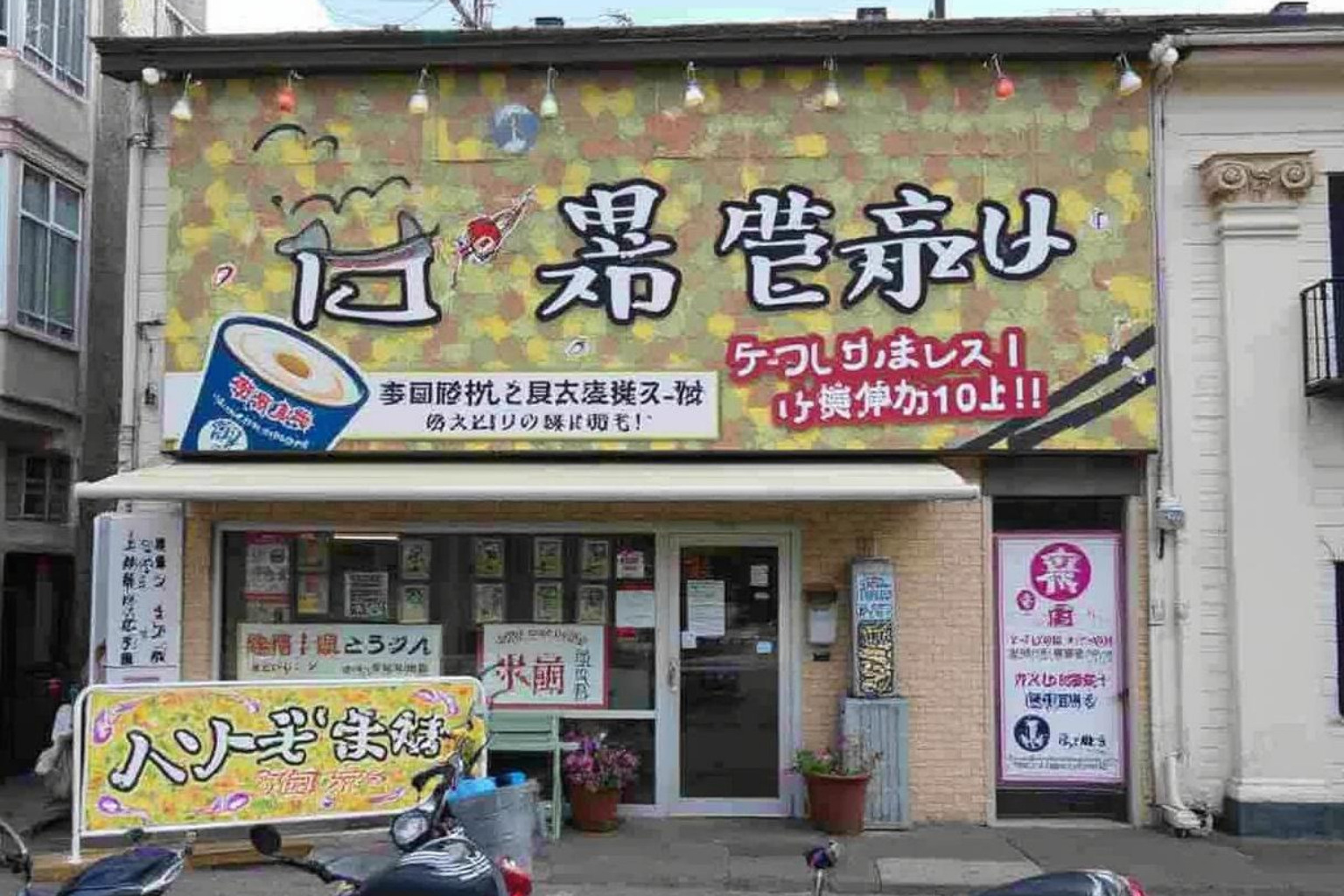
Regarding dietary accommodations, Jeju noodle bar can make some vegetarian modifications, though the menu is heavily focused on pork and seafood. The rich broths that define the restaurant’s signature dishes are typically made with animal bones, so strict vegetarians and vegans may find limited options.
For gluten-sensitive diners, it’s important to note that traditional Korean ramyun noodles often contain wheat. The restaurant can provide information about ingredients, but cross-contamination in a small kitchen is always a concern for those with severe allergies.
Price-to-Experience Breakdown
Understanding the cost structure at Jeju noodle bar helps you plan your visit effectively. Ramyun bowls range from $22-38, with most falling in the $28-32 range. Appetizers and small plates typically cost $12-18, while drinks range from $8-15.
A typical dinner for two might include:
- Two ramyun bowls: $56-76
- One or two appetizers: $12-36
- Drinks: $16-30
- Tax and tip: $15-25
- Total: $99-167 for two people
This represents remarkable value for a Michelin-starred experience. The restaurant doesn’t add automatic service charges, so standard NYC tipping (18-22%) applies.
The beverage markup is reasonable by NYC standards, though still significant. A bottle of sake that might cost $25 retail could be $45-55 here. However, the careful curation and proper serving temperature justify the premium.
Tips for Snagging a Table at “Jeju Noodle Bar”
Getting a reservation at Jeju noodle bar requires strategy, especially for weekend dinner slots. Here are our best tips:
Timing Matters: Reservations typically open 30 days in advance on Resy. Set a reminder and be ready to book exactly at the release time for popular slots.
Consider Off-Peak Hours: The 5:00 PM Wednesday-Friday slots and 3:00 PM weekend slots are often easier to secure and offer the same great food with a more relaxed atmosphere.
Counter Seating Perks: If available, choose counter seats. You’ll get an up-close view of the kitchen action, and the chefs often provide extra attention and explanations of dishes.
Wait-List Strategies: Even if your preferred time shows as booked, join the wait list. Cancellations happen regularly, especially for weeknight reservations.
Party Size Flexibility: Smaller parties (2 people) have more options than larger groups. The restaurant’s intimate size limits options for parties of 4+.
Atmosphere, Reviews & Nearby Things to Do
Step inside Jeju noodle bar and you’ll immediately understand why this place feels different from other Michelin-starred restaurants. The minimalist décor keeps things refreshingly simple – no stuffy white tablecloths or intimidating formal service here. Instead, the focus stays exactly where it should be: on the incredible food emerging from the open kitchen.
The open kitchen counter is where the magic happens, and honestly, it’s the best seat in the house. Watching the kitchen team work is like getting a front-row ticket to a carefully choreographed performance. You’ll see the precise timing as broths get ladled, the careful arrangement of each topping, and the steam rising from bowls that smell absolutely incredible.
The hip playlist creates just the right energy level – contemporary enough to feel current but never so loud that you can’t have a conversation. During peak dinner hours, the compact space buzzes with excitement, but it never feels overwhelming or rushed.
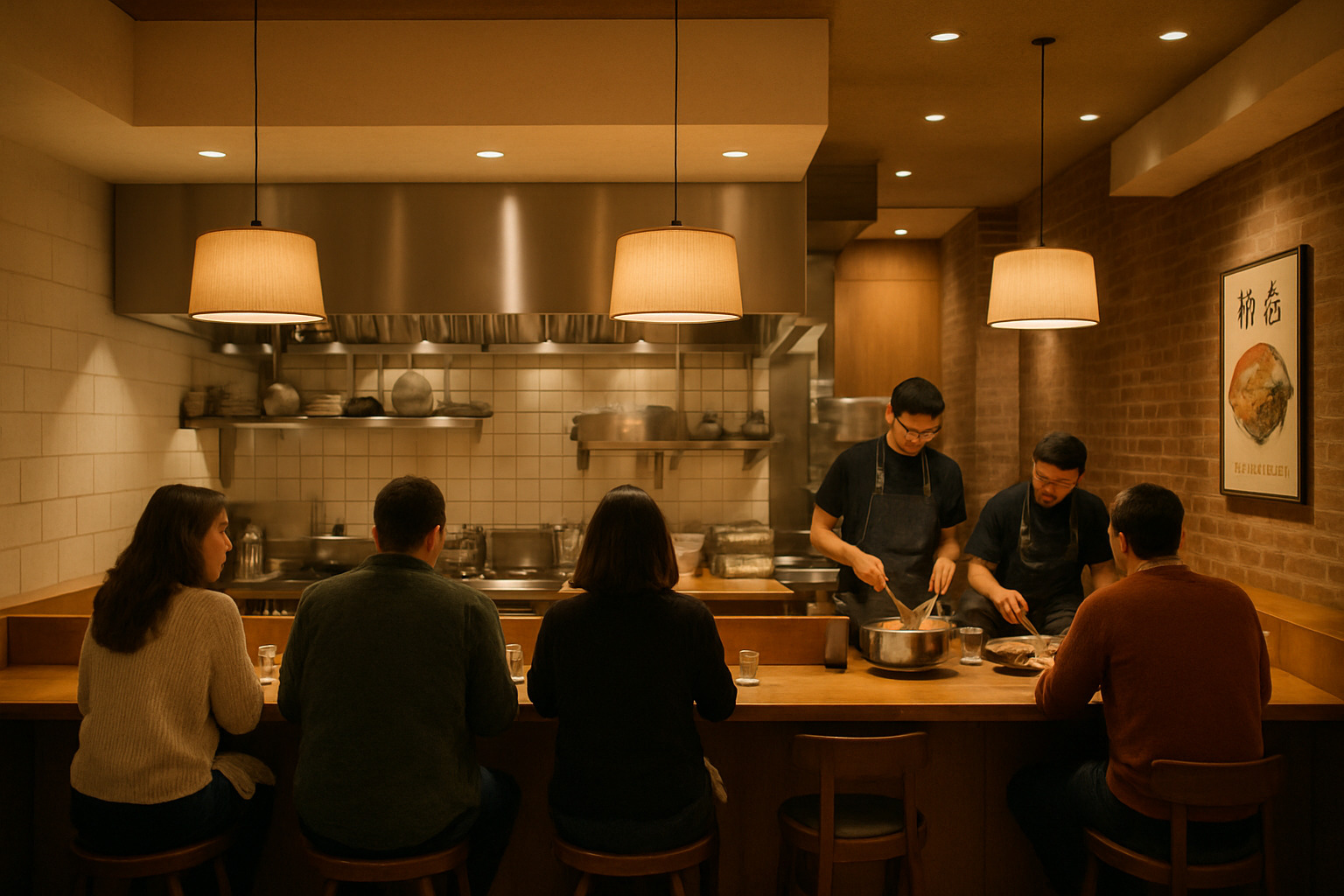
The West Village location couldn’t be more perfect for making your dinner part of a larger evening trip. The neighborhood’s cobblestone streets and historic brownstones create an atmosphere that feels worlds away from the typical Manhattan dining scene. Hudson River Park sits just a few blocks west, offering peaceful waterfront views that make for a perfect pre-dinner walk.
What Critics Love About “Jeju Noodle Bar”
Food critics consistently rave about Jeju noodle bar for reasons that go well beyond just the Michelin star. The flavor innovation gets mentioned in nearly every professional review – the way Chef Kim takes traditional Korean techniques and presents them in ways that feel both authentic and exciting to New York palates.
The approachable price point is something critics can’t stop talking about. When you can experience Michelin-quality cooking for under $40 per person in Manhattan, that’s genuinely newsworthy. Food writers understand how rare this value proposition is in the city’s dining landscape.
Friendly service earns consistent praise because the staff manages to be both knowledgeable and completely unpretentious. They’ll happily explain the difference between ramyun and ramen, or recommend the perfect sake pairing, without ever making you feel like you’re being lectured.
The sensory broth aroma that Michelin specifically highlights has become legendary among food critics. Multiple reviews mention how the smell of the pork bone broth announces each bowl’s arrival, creating anticipation before you even take your first spoonful. This attention to the complete sensory experience – not just taste, but aroma, visual presentation, and even the sound of the busy kitchen – lifts the entire meal.
Critics also love the restaurant’s confidence in its focused concept. Instead of trying to offer something for everyone, Jeju noodle bar does a few things exceptionally well, and that restraint resonates with professional reviewers who see too many restaurants lose their identity trying to please every possible diner.
Pair Your Visit With Local Attractions
The West Village setting makes Jeju noodle bar perfect for a full New York evening out. Start with a leisurely Meatpacking District walk to work up an appetite – the contrast between the area’s industrial-chic vibe and the cozy restaurant creates an interesting dining journey.
A High Line sunset walk is absolutely magical, especially during golden hour. This unique liftd park offers some of the city’s best views and interesting art installations. The timing works perfectly – catch the sunset on the High Line, then head to dinner as the restaurant opens.
After your meal, the neighborhood offers plenty of options for dessert at neighborhood cafés. The West Village has everything from classic New York bakeries to trendy gelato shops, so you can find something that complements your ramyun dinner without overwhelming your satisfied palate.
The area’s walkable streets and historic charm make it easy to explore More info about Interesting Places to Eat if you’re planning a full food-focused trip during your New York visit. The concentration of quality dining options means you’re never far from your next great meal.
Frequently Asked Questions about Jeju Noodle Bar
Does Jeju Noodle Bar accommodate vegetarians or gluten-free diners?
Jeju noodle bar faces some natural limitations when it comes to dietary accommodations, but they’re willing to work with diners when possible. The reality is that Korean ramyun culture centers heavily around rich pork bone broths and wheat-based noodles, which creates challenges for certain dietary needs.
For vegetarian diners, the options are honestly pretty limited. The restaurant’s signature broths – the foundation of what makes this place special – are built on pork bones that simmer for hours. However, some of the appetizers and salads can potentially be modified. The Persian cucumber kimchi and certain small plates might work for vegetarians, though you’ll want to ask about fish sauce and other animal-derived ingredients that are common in Korean cooking.
Gluten-free dining presents even bigger challenges. Traditional Korean ramyun noodles contain wheat, and many of the sauces and seasonings include soy sauce or other gluten-containing ingredients. The intimate kitchen setup also makes cross-contamination a real concern for anyone with severe sensitivities.
Your best bet is calling ahead at (646) 666-0947 to discuss your specific needs. The staff genuinely wants to help when they can, and giving them advance notice allows them to think through what modifications might be possible.
How far in advance should I book a reservation?
Booking Jeju noodle bar requires some strategy, especially if you have your heart set on weekend dinner. The most competitive slots – those Friday through Sunday evening prime times – often disappear within hours of becoming available on Resy.
Reservations typically open 30 days in advance, and you’ll want to be ready right when they drop if you’re targeting popular times. Set a phone reminder and have your Resy app ready to go. It sounds a bit intense for noodles, but remember – this is Michelin-starred noodles at incredibly reasonable prices.
Weeknight reservations are much more forgiving. You can often snag a Wednesday or Thursday table with just a few days’ notice. The 5 PM opening slots and later 9 PM times also tend to have better availability, even on weekends.
Don’t give up if your preferred time shows as booked. Join the waitlist – cancellations happen regularly, and the restaurant is good about notifying people when spots open up. Sometimes life gets in the way of dinner plans, and that could work in your favor.
Why is Jeju Noodle Bar considered one of NYC’s best-value Michelin restaurants?
Jeju noodle bar has earned this reputation because it delivers something almost impossible to find in Manhattan: genuine Michelin-quality food without the Michelin-level prices. When you can have a complete, satisfying meal for under $40 per person, you’re talking about prices that are accessible to regular food lovers, not just special occasion splurges.
But here’s the thing – it’s not just about being cheap. Plenty of restaurants offer low prices. The magic happens in that quality-to-price ratio. You’re getting premium ingredients, sophisticated technique, and flavors that stick with you long after you leave. The same level of skill and attention that you’d find at restaurants charging $100+ per person.
The casual atmosphere adds another layer of value. You don’t need to dress up, you don’t have to commit to a three-hour tasting menu marathon, and you don’t have to steer complicated etiquette. You can just show up, eat incredible food, and leave feeling satisfied rather than overwhelmed.
This approach reflects a broader shift in how we think about fine dining. The best experiences aren’t always the most expensive or formal ones – sometimes they’re the places that focus on doing a few things exceptionally well and making them accessible to everyone.
Conclusion
Jeju noodle bar has quietly revolutionized what it means to dine at a Michelin-starred restaurant in New York City. By proving that world-class food doesn’t require world-class prices or intimidating formality, this West Village gem has opened fine dining to a whole new audience.
The restaurant’s influence extends far beyond its small dining room. Food tourists from around the globe now make pilgrimages to this unassuming noodle shop, drawn by the promise of experiencing something truly special. Jeju noodle bar has become a symbol of NYC’s evolving food scene – one that values authenticity and accessibility alongside technical excellence.
Chef Douglas Kim’s approach represents the best of modern restaurant culture. Instead of trying to impress with complexity or exotic ingredients, he focused on perfecting something fundamental – a really great bowl of noodles. This chef-driven noodle renaissance has inspired countless other restaurateurs to look at comfort foods through a more sophisticated lens.
What makes Jeju noodle bar essential dining isn’t just the Michelin star or the reasonable prices. It’s the way the restaurant makes you feel – welcomed, satisfied, and excited about food. The aromatic broths, the theatrical open kitchen, and the genuine hospitality create memories that last long after your last spoonful.
For anyone exploring New York City’s incredible dining landscape, this restaurant offers something you can’t find anywhere else. It’s a place where Korean tradition meets Manhattan innovation, where fine dining meets comfort food, and where exceptional quality meets everyday affordability.
The success of Jeju noodle bar proves that great restaurants don’t need to choose between being approachable and being excellent. Sometimes the most meaningful thing you can do is simply make really good food available to everyone who wants to experience it.
At The Dining Destination, we’re passionate about restaurants that break down barriers and create new possibilities. Jeju noodle bar embodies everything we believe makes dining exciting – it’s innovative without being pretentious, traditional without being boring, and memorable without being expensive.
Ready to find more restaurants that are changing the game? Start on your next dining journey and explore our guides to exceptional dining experiences around the world.
